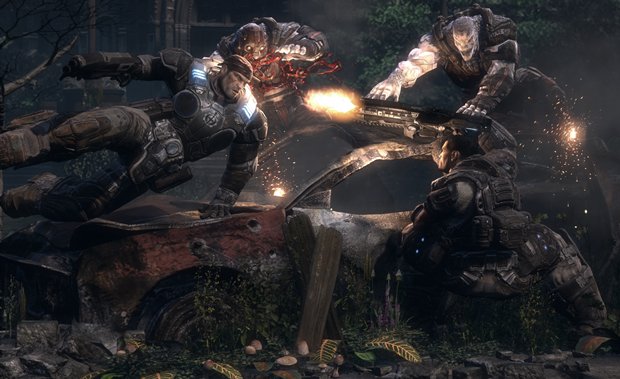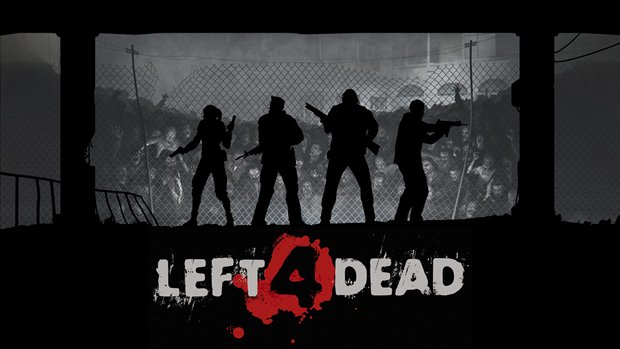The Top 7... Best new franchises of this generation
In an age of sequels and remakes, these bold new ideas rose above the rest

Why it’s better than the rest: Gears of War was essentially a new Halo-level event made specifically for the fledgling Xbox 360. Naturally it was backed by an extensive, months-long advertising blitz that culminated in a huge launch day celebration, but all the hoopla was deserved – not only was the single-player game loaded with cinematic “oh shit” moments and fantastically gory chainsaw battles, but it also brought “online co-op” into gamers’ vernacular like no console title before. It was the 360 experience, one that took advantage of the hardware’s online features and helped create a brand-new, must-have IP at the crucial one-year-old point in the 360’s existence.
Legacy: Gears has since spawned a mini merchandise empire full of toys, books and geekily awesome life-size props. It also made slow-paced, deceptively ponderous commercials for M-rated shootouts a bit of a trend:
Above: “Mad World” set a tone that had nothing to do with in-game content, but it sure was an effective commercial
But plastic doo-dads and brilliant TV spots aren’t the reason it’s on this list - many of the features Gears and Gears 2 popularized (cover shooting, roadie run, horde modes) have been outright stolen and used to death by the games industry at large. It’s also become a holiday staple for Microsoft; since 2006, every fall has been led by either a Halo or Gears game, including Gears 3 in 2011. In short, Gears has become second only to Halo in terms of importance to Microsoft and the Xbox brand as a whole, and it didn’t get that way by marketing alone – it got there through exquisite and (it’s an overused buzzword but it really fits here) viscerally bloodthirsty gameplay.

Why it’s better than the rest: Completely unpredictable mayhem. While Gears and every other game on this list may have larger sales and bigger name recognition, L4D trumps them all in terms of sheer gameplay. The innovative “AI director” constantly alters the zombie horde to increase and decrease intensity as you play; if you and your pals run into a car-throwing Tank in one playthrough, he may not be there next time. Or that zombie rush near the beginning of the second chapter may come a little sooner… or later… or not at all. Every session is new and the tension never lets up for a second, creating a game that still feels fresh a hundred hours in. Throw in absolutely flawless controls and you’ve got the best, most nail-biting co-op experience of modern times.
And when it comes to story, L4D managed to convey a broken, horrific world with nothing but in-game dialog and expertly placed nuances in the environment. No lengthy cutscenes, no hidden journals that fill out a backstory, just banter and scrawling on the wall – and it honestly made a deeper, more believable world than most games this generation.
Legacy: L4D2 released just one year later and added more infected, new weapons, an eclectic new cast and a genius weekly event called “mutation” that altered the way the game was played. One week it’s infinite ammo, next week it’s something else. Developer Valve has continuously updated both L4D and L4D2 with beefy DLC and new modes that refine the multiplayer experience to near perfection, and continue the “every game is fresh” mentality that made the original so addicting.
Weekly digests, tales from the communities you love, and more
Above: Brad’s plan is just one of millions the AI Director foiled
Want to casually dabble in L4D? There’s still a shockingly strong game to blast through, filled with exciting set pieces and top-notch level design. Want to really tear into it? There’s an ocean of co-op strategy to consider, from player formation to timing respawns to equipment and weapon loadouts for a given stretch. And considering Valve’s devotion to the series, you can expect near-constant (and often free) updates to a game that’s already more than paid for itself. All this from a series that’s barely two years old.
GamesRadar+ was first founded in 1999, and since then has been dedicated to delivering video game-related news, reviews, previews, features, and more. Since late 2014, the website has been the online home of Total Film, SFX, Edge, and PLAY magazines, with comics site Newsarama joining the fold in 2020. Our aim as the global GamesRadar Staff team is to take you closer to the games, movies, TV shows, and comics that you love. We want to upgrade your downtime, and help you make the most of your time, money, and skills. We always aim to entertain, inform, and inspire through our mix of content - which includes news, reviews, features, tips, buying guides, and videos.


